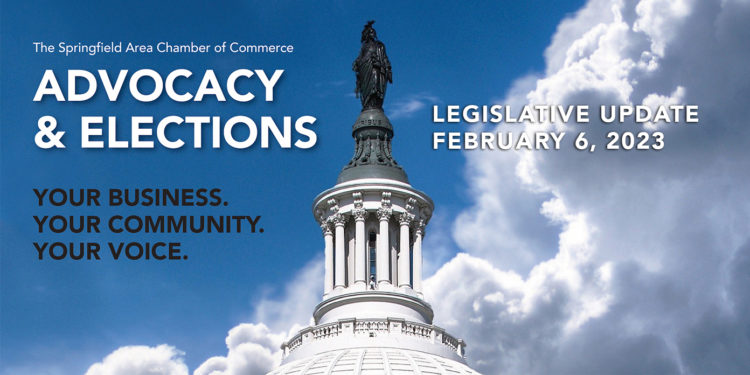Legislative Update: February 6, 2023

We’re monitoring Oregon’s 2023 legislative session for issues of impact and interest to our members. Here’s the latest update from our legislative counsel at the Oregon State Chamber of Commerce (OSCC).
The legislature feels like it’s in full swing now.
Governor Tina Kotek released her budget blueprint, and all of the state agency budget bills were finally released. The release of the Governor’s Recommended Budget, though not a binding document from a legislative perspective, really sets the stage for both budgeting and policy purposes. Overall, the pragmatism of the governor’s budget was clear as it focused increased spending on just a handful of priorities and then left most other programs and agencies in a status quo position.
Housing drew the most attention as the Governor’s budget included $1 billion extra to address the housing and homelessness crisis including a massive $770 million in bonding.
The Governor’s K-12 schools budget comes in at $9.9 billion – more than the $9.5 billion current service level requirement but far less than the $10.3 billion being sought by school advocates.
Other notable priorities include $40 million to support the public defense system and $200 million aimed at incentivizing semiconductor production in Oregon.
The governor’s overall spending plan calls for about $32 billion in spending while the state has about $30.5 billion in revenues. While her plan does not include tapping into the state’s robust $2 billion reserve fund, she did make the unique recommendation of diverting $765 million that is scheduled to be added into the reserve fund this year. Such a diversion requires a 3/5th ‘supermajority’ vote of the legislature, which will require Republican support.
The most notable feature of the Governor’s proposed budget is that it does not include any significant tax increases or program cuts.
There will undoubtedly be a lot of political pressure for lawmakers to keep some or all of the $3.7 billion ‘kicker’ tax rebate that is slated to go back to taxpayers early in 2024. But such a move would require, again, a ‘supermajority’ of legislators to approve. It is doubtful Republicans would support this.
Budget backdrop
Again, it is important to reiterate that the 2023 session will be dealing with a modest revenue shortfall. As of now, there is a projected $560 million current service level budget deficit on a $30.5 billion General Fund. This is about a 1.5% budget deficit.
As noted, Governor Kotek has proposed $32 billion in spending which will rely on diverting some money – about $750 million – away from the state’s reserve funds.
The 2023 session will likely revert back to the norm as the budget will likely be a zero-sum game. There is no longer unlimited revenue to pay for costly legislation.
Revenue Needs
Again, the state will have some revenue needs that will make the budget environment challenging. First and foremost, Oregon needs to commit $1 billion for the Interstate Bridge Replacement proposal that would seek to rebuild the I-5 Bridge that connects Oregon with Washington. The Governor’s budget is silent on this subject and revenue sources.
There is also disagreement brewing about the level of funding that the state’s K-12 system will require for 2023-25. While budget analysts believe the system needs $9.5 billion to keep whole, education advocates say the K-12 system will really require $10.3 billion or more. Governor’s Kotek’s budget recommends $9.9 billion.
Also in the mix, lawmakers want an extra $300 million intended to lure semi-conductor manufacturers to conduct their operations in Oregon. The Governor’s budget includes $200 million.
Early Legislative Priorities
Legislative leaders are looking to secure some early, bipartisan legislative wins. The first is a major funding package – about $130 million – to start addressing acute homelessness issues and building more housing.
The second is an incentive package being considered by the special Joint Committee on Semiconductors to leverage Federal money to encourage semiconductor manufacturing in Oregon.
Session Timelines
The session deadlines for 2023 are more aggressive than in session’s past. Also, most committees are only allotted two, 90-minute committee sessions per week.
Combined with what will likely be a record number of bills introduced this session, we are expecting a lot of bills to bottleneck in committee.
February 21st is the deadline for legislators to submit any requests for legislation.
March 17th is the first meaningful procedural scheduling deadline. Any bill not scheduled for a committee ‘work session’ by this date is considered dead. This is the first real indication of which bills will not survive the 2023 session.
OSCC Bill Tracking
This week we are watching a handful of bills that have impacts on local business communities:
HB 2800 expands age discrimination liabilities for employers. The business community has concerns regarding this legislation. OSCC will testify.
HB 2536 limits what third party food platforms can charge restaurants for take-out orders at 5% and delivery orders at 15%.
HB 2433 would increase the exemption in the CAT tax for small businesses from $1 million to $5 million. OSCC will support this legislation.
HB 2510 increases state support for county fairgrounds.
HB 2624 increases the $1 million exclusion for Oregon’s estate tax. OSCC supports the legislation.
The Springfield Chamber of Commerce will be publishing the OSCC’s legislative updates weekly, or as received. Any opinions expressed or implied are those of OSCC and do not necessarily reflect those of the Springfield Chamber or its representatives. If you’d like more information, please visit our Advocacy & Elections Page.
Discover more from Springfield Bottom Line
Subscribe to get the latest posts sent to your email.






